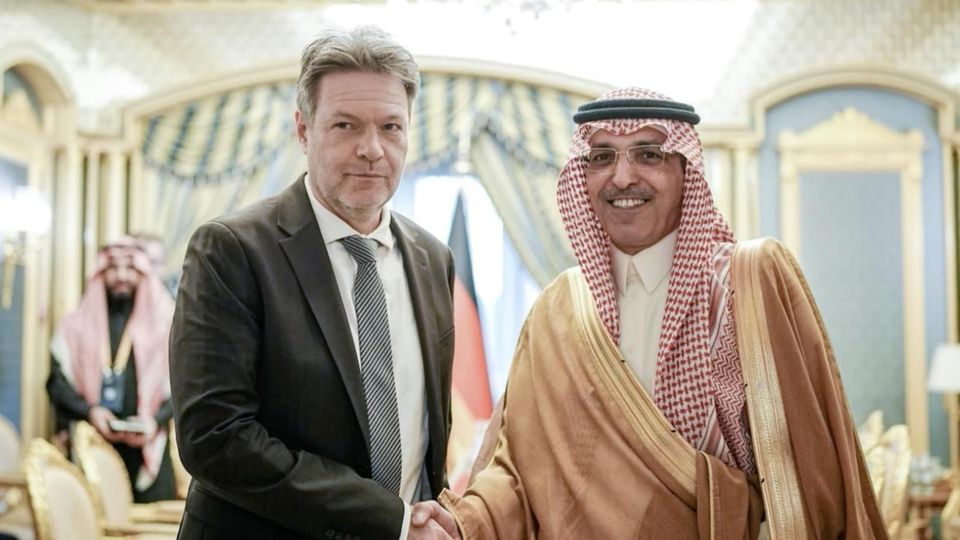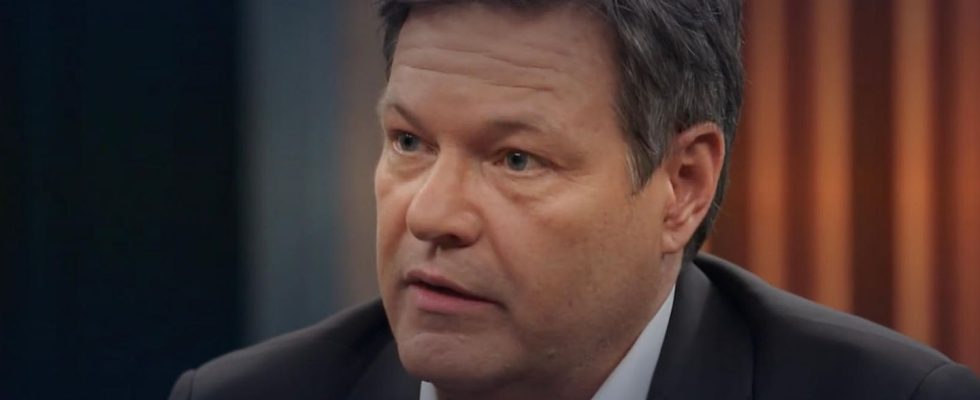TV review
“Caren Miosga”
Robert Habeck spreads optimism – and is alone in doing so
Federal Minister of Economics Robert Habeck tries to explain the traffic light government’s policy on “Caren Miosga”.
© Screenshot NDR
Between hyperactivity and self-blocking: the traffic light wanders into its third year. Caren Miosga wanted to know from Robert Habeck whether the government would overwhelm the country. In the end, the impression arose that there was too much demand elsewhere.
By Mark Stöhr
Caren Miosga’s guests were:
- Robert Habeck, Federal Minister of Economics (Alliance 90/The Greens)
- Julia Löhr, business correspondent in the capital city editorial office of the “Frankfurter Allgemeine Zeitung”
- Gunnar Groebler, CEO of the steel group Salzgitter AG
The fact that Habeck and Lindner are currently at odds again is now only acknowledged with a shrug. The economics minister surprised his colleague from the finance department in a Bundestag debate last week with the proposal to set up a special fund to relieve the burden on companies. Pump past the debt brake, so to speak – the veto from the FDP boss was not long in coming. He did not choose the desk in the plenary session, but rather the media megaphone. “How would it be if you sat down in a room with Mr. Lindner rather than communicating through the public?” suggested Caren Miosga. Robert Habeck teased back: “We often sit in the same room, often all night long.”
Action week
“Absolutely understandable” to “disproportionate”: This is how the parties feel about the farmers’ protests
Habeck sees no consensus for savings
There is no time for misguided communication anymore. The minister knows that too. The economy is waiting for reliable framework conditions to invest more in infrastructure and research again. And on relief. In France and the USA, for example, the corporate tax is 25 percent, in Germany it is 30 percent. A reduction of 5 percent, Habeck calculated, would cost the federal budget around 30 billion euros. Where will the money come from? “We can hardly scrape together the 8 billion under the Growth Opportunities Act.”
He did not explicitly say that he was in favor of debt instead of savings. But the subtext shone through clearly. When it comes to agricultural diesel alone, it has become clear how fierce the resistance to savings is, he said. And here it was just 450 million euros. “I don’t know whether democratic politics in the country can stand this.” Especially since no idea of cuts that has been discussed so far has any prospect of achieving a halfway stable consensus. Habeck complained that the political space as a whole was blocked. Across the entire spectrum, not just within the coalition. Conversations are almost only possible with preconditions. “It can’t be the case that democratic parties don’t talk to each other.”
“The climate money is screwed up from start to finish”
Salzgitter boss Gunnar Groebler made it clear how the squabble in Berlin and between the federal states was having a concrete impact. He is currently “decarbonizing” a third of production to produce climate-neutral steel. It could happen in 2025 – but politicians cannot keep their promise to provide enough green electricity and hydrogen. Too few systems, too few networks. It sounds bitter, and it is.

Salzgitter AG received one billion euros from the state for the transformation process. Groebler calls this an “investment in Germany as a location,” not a “subsidy.” The business journalist Julia Löhr considers such aid to be too high and too selective. Select large companies received huge amounts of money that were missing elsewhere. “I fear,” she said, “these payments will become permanent subsidies because we will never be able to produce the huge amounts of green electricity and hydrogen to keep all the energy-intensive businesses here in the country.”
At the very end – Robert Habeck had already put on his after-work face – Caren Miosga came around the corner with an unpleasant question. “When, Mr. Minister, will the climate money come?” Habeck sighed audibly and mumbled something about still unclear “counting mechanisms” and a “perspective introduction”. Most likely not in this legislative period. Then Julia Löhr’s collar burst. “The climate money is a prime example of how the coalition celebrated itself as a coalition of progress two years ago and is now hanging over the counter with a hangover.” Her conclusion: “It’s screwed up from start to finish.”

